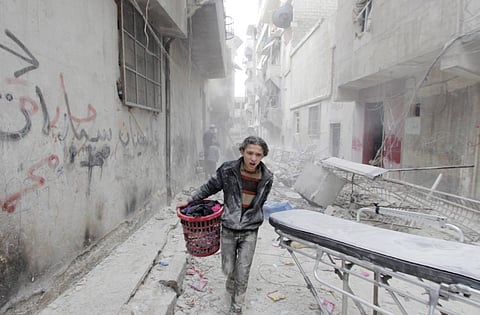Syria’s civil war marks a grim milestone
As Syrians watch end of a decade of mayhem, they remain unaware of what lies in store

This we know: The civil in war in Syria, which erupted exactly a decade ago this week, was a merciless, blood-and-fire armed conflict, singular in modern Arab history for having scarred a whole generation and, in a trickledown effect, reshaped the geopolitics of the whole region. Today, as Syrians watch the end of one decade of mayhem, they remain unaware of what the next will bring.
That war began, as we all recall, in the rustic border town of Dara’a on March 15, 2011, then quickly spread nationwide after ordinary Syrians everywhere in the country threw down the gauntlet, demanding, albeit peacefully, political freedom and a humane social order in their lives — a call for equity often seen as the pride and burden of victimised peoples throughout history. Then came the unspeakable cruelties, cruelties that, as we went on to discover, lay outside words as they lay outside reason.
The mother of all truisms is that armed conflict and human suffering go hand in hand. It is a time when men — almost always men — leave by the wayside what there is in them of man and restore what had been, at the primeval birth of their species, of beast.
But no armed conflict in recent history, I submit here with no resort to hyperbole, epitomises this regressive havoc than the Syrian civil war, whose milestone we are observing this week.
The numbers alone boggle the mind: Well over 600,000 people killed and one million injured, many left with permanent disabilities. More than 5 million refugees in the surrounding countries and roughly 7 million internally displaced. Among these 12 million disperse folks — half the population of Syria — 5 million are children, most of whom, instead of attending school, are engaged in child labour.
Pity these kids.
A generation wiped out
The sadness we feel over the fate that has befallen Syrian children was greatly amplified as we perused a report released earlier this week by UNICEF — the United Nations agency responsible for providing humanitarian and developmental aid to children worldwide — in which we were told that 12,000 of them have died during the war.
Twelve thousand! Twelve thousand young souls that their Maker had delivered unto our custody to fulfil a purpose — and that purpose assuredly was not that they fall victim to, say, barrel bombs and poison gas.
Let’s pause for a moment here and in our mind’s eye look at these astounding numbers again, much in the manner of a visitor in a museum stepping back from a painting on a wall in order to perceive it better — except, in this case, it is fitting that the painting be Guernica, Picasso’s 1937 iconic masterwork, which depicts, in apocalyptic imagery, the suffering, violence and chaos that accompany all wars.
When we look at these numbers, after we’ve placed them in a lived world where human existence anchors its meaning, they begin to acquire an autonomous, almost sentient feel of their own that speaks to us, about us, from us.
If we have ceased at one point in this ten-year-long, bloody conflict, between ruler and ruled, to turn away in nauseated disbelief at the carnage in Syria, surely it must have been because that carnage had become so unspeakable, so beyond all rational understanding, so alien to our sensibility, that no arsenal of insight in our possession could’ve grasped its intimations. For how does one grasp the inward preoccupations of a people who stand alone, crying havoc, as their nation stands equally alone, rending its own flesh?
We are thus left invoking images, on this grim anniversary, of Syrian refugees — all 12 million of them — who are unable to defy the jeering totem of dispersal and statelessness, muttering stifled laments, often to themselves, in the dead of night, about the dread fact that their nation, had effectively perished — laments that, when verbalised, resemble the irrational babblings of an unweaned baby. (Look, I remember, as a little child in 1948, how my own parents, destitute in a refugee camp in Beirut, lamented their lost Eden in Palestine.)
What do you expect from the tormented people of Syria, whose homeland has been torn asunder, their cities destroyed — sometimes, like the city of Aleppo, turned into a latter-day Dresden — and their homes levelled, and who, ten years after the fact, continue to wander the face of the earth, carrying, like heavy cargo on their backs, shattered — yet rich — fragments of their patrimony’s culture and that culture’s once halcyon days, all the while in search of asylum.
There is no political dogma, no article of faith, no held grudge — indeed no excuse of any kind — so inviolate as to justify, let alone cover the shame of, the killing of so many souls, the infliction of so much pain and the destruction of so much social capital as that visited upon the people of Syria over the last decade. None. None whatsoever.
— Fawaz Turki is a journalist, academic and author based in Washington. He is the author of The Disinherited: Journal of a Palestinian Exile







